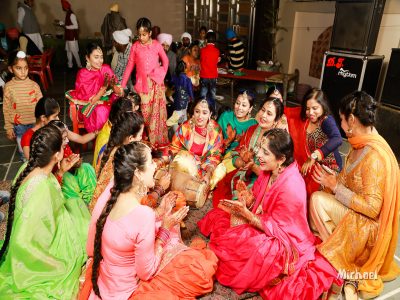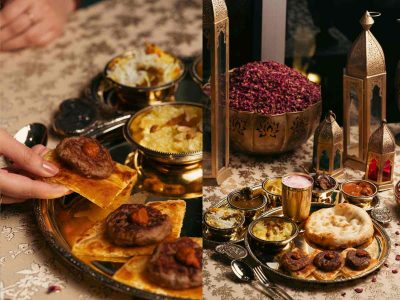Pupps Roy is popular in the expat party scene in the capital. He has chalked out a radically different life that makes him endearing to his friends
Pupps Roy is such a sensation. He’s a popular figure amongst the party crowd of expats in the city. His arrival is anticipated with bated breath at rooftop parties, and bars, and dinners, because the party begins when he descends on the scene. This may seem a cliché but it is appropriate to describe Roy as someone you may love or hate but can never ignore.
“I’m the party queen,” he says with certain assertiveness, in case we don’t know. He’s the anti-thesis of a conventional ‘man.’ He wears hot pants and make-up, his colourful googles are a trendsetter, his clothes shimmer and his presence is psychedelic. He’s fun-loving but extremely sensitive, easily exited and hurt. A rebel he is for sure. People like him for he’s evolved, he lives life in the present moment, without carrying the burdens of the past, or any need to control the future outcomes.
The feeling persists that his flourish is a cover for the vigorous wriggling he would have experienced that shaped him. It’s not easy to be different and stand out as unique. One tends to reduce such mercurial personalities to showstoppers, they become a convenient symbol that life’s good. But what about they themselves, who challenge conventions and norms on a daily basis?

“Why are you such a big hit with the expats?” The question is not simply why expats like to hang out with him but also why he’s comfortable in their company. And there’s no racial or ethnic bias, he’s friends with Caucasians, Orientals or Africans. His answer to this question is like a reflex action, “Because they don’t judge.” Roy is not questioned for what he is, or seems to be, and is allowed to exist the way he wants. And the fact that he is non-conventional, in some sense even radical, and transparent, makes him a big hit.
“Party is a state of mind,” Roy says, clarifying, “It doesn’t matter if I’m with friends, strangers or alone.” As a matter or practice, a pre-drink is an integral part of getting ready for a party, “to get into the groove.” But that doesn’t mean he will necessarily go to the party he’s getting ready for. A phone call is all he needs to change his plans. Or he may just decide to stay put at home. “I’m intuitive in my dealings with the world.”
Roy is a globe trotter, has been to all the continents of the world. The most recent trip was to varied destinations in the West Indies, and in July he plans to travel to Europe for a month. The fact that Roy is widely travelled, that his worldview is liberal, makes him merge seamlessly into the expat crowd. They like him and adore his company. “Roy is a psychedelic butterfly,” is how an expat friend who doesn’t want to be named described him.
Roy belongs to West Bengal, his father was a cop and he had to change eight schools to get an education. When he arrived in Delhi in 2005, he knew not a living soul here. The new place offered newer possibilities. He blossomed. His day job is that of a Microsoft Certified Technician: the work starts early and is done by late afternoon. He wears a trouser and shirt to work and adheres to the dress code. He has a collection of 40 hats and fascinators, no surprise that he wears many hats. Apart from his day job, he has dabbled in fashion design, make-up, styling and what not.
Initially, he would go to a bar, stand in a corner sipping his drink in a crowd of strangers. People walked up to him, conversations ensued, acquaintances were made, and some of them became friends. In 2011, he would hang out in Café 27 in Kailash Colony which had become a party venue for expats. It was managed by an African called Padja who was a good friend. As the years rolled by, Roy became a fixture in the expat scene of Delhi.

Roy’s life in Delhi can be described by a bundle of clichés, like change is the only constant in his life. “Who needs lovers, if you have a bunch of good friends,” he says. He has some five good friends who form his support system in his adopted city. He has a lot of nice people around him, “I call them ‘my angels’”, he explains. He also draws strength from an elder sister. “Parents love you the way you are,” he says when questioned about his relationship with his mother, who passed away recently.
Asked about his love life, Roy declares in matter-of-fact way, ““I’m polyamorous. When I have a break-up, I fall back on others.”
One gets the feeling that he’s alone in a crowd, but he asserts, “I’m happy.” His life has bestowed on him many pleasant surprises. People who were purportedly nasty to him were taken away from his life by divine providence, like a surly teacher who soon received transfer orders. A Buddhist, he’s not pompous when he says, “I got whatever I wanted,” but there’s a sense of gratitude to forces unseen: “I didn’t have to work hard for it. I’m lucky.” Clearly, it matters little what the world has to say about him.
Perhaps after lot of struggle, Roy has arrived in life. “I’m the same whether I’m in Delhi or Paris,” he says with a flourish. With his hot pants and his carefree attitude, he dazzles the world around him wherever he goes. “People stare (at me) everywhere,” he quips.





